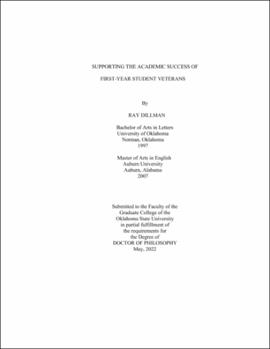| dc.contributor.advisor | Wanger, Stephen P. | |
| dc.contributor.author | Dillman, Ray | |
| dc.date.accessioned | 2023-03-16T21:14:22Z | |
| dc.date.available | 2023-03-16T21:14:22Z | |
| dc.date.issued | 2022-05 | |
| dc.identifier.uri | https://hdl.handle.net/11244/337125 | |
| dc.description.abstract | The Post-9/11 GI Bill of 2009 dramatically increased the investment of federal funds that support service members leaving the military and using postsecondary educational institutions as the means of transitioning into the civilian workforce. The transitioning service members are often referred to as student veterans. The increased investment spurred additional accreditation requirements affecting every college and university that receives federal funds for their student veterans. Accrediting bodies enforce policies meant to improve students’ degree or certificate attainment. This study assists institutions in maintaining accreditation requirements in two ways. First, the study explains why student veterans are a unique subgroup within the postsecondary student population. Second, the study uses a generalizable, quantitative methodology to determine the best services to support the subgroup’s attainment goals. Previous studies found the first year of collegiate study crucial in determining whether student veterans will attain a degree or certificate. Therefore, this study distributed a cross-sectional survey in a Midwestern state that asked student veterans to rate the importance of twenty-two campus services during their first year of collegiate studies. The calculation used to determine the importance of the rated services was a weighted mean score followed by a Chi-square test to determine statistical significance. The study then relied on Schlossberg’s widely accepted Transition Model to discuss the services campuses should prioritize for their student veterans. Likely, due to the impact of the GI Bill, the most important service a campus should provide to the unique subgroup is assistance with their VA educational benefits. For campuses prioritizing services for their student veterans, this study suggests an office designated for military-affiliated students that assists with VA educational and non-educational benefits, admissions and enrollment requirements, and academic advising. | |
| dc.format | application/pdf | |
| dc.language | en_US | |
| dc.rights | Copyright is held by the author who has granted the Oklahoma State University Library the non-exclusive right to share this material in its institutional repository. Contact Digital Library Services at lib-dls@okstate.edu or 405-744-9161 for the permission policy on the use, reproduction or distribution of this material. | |
| dc.title | Supporting the academic success of first-year student veterans | |
| dc.contributor.committeeMember | Kearney, Kerri S. | |
| dc.contributor.committeeMember | Cole, Ki M. | |
| dc.contributor.committeeMember | Pappas, James M, | |
| osu.filename | Dillman_okstate_0664D_17577.pdf | |
| osu.accesstype | Open Access | |
| dc.type.genre | Dissertation | |
| dc.type.material | Text | |
| dc.subject.keywords | campus support | |
| dc.subject.keywords | first-year students | |
| dc.subject.keywords | quantitative research | |
| dc.subject.keywords | Schlossberg's transition theory | |
| dc.subject.keywords | student veterans | |
| thesis.degree.discipline | Education Leadership and Policy Studies | |
| thesis.degree.grantor | Oklahoma State University | |
